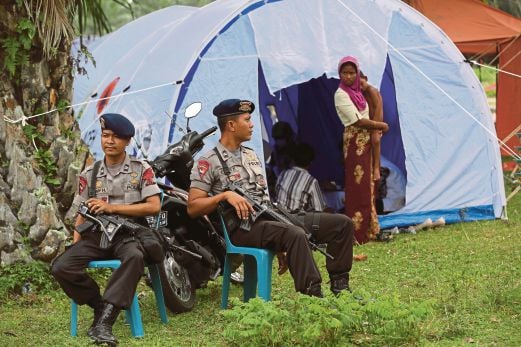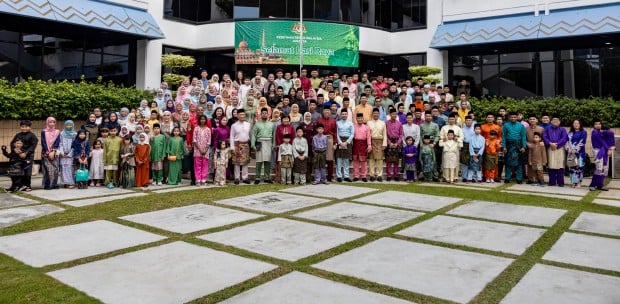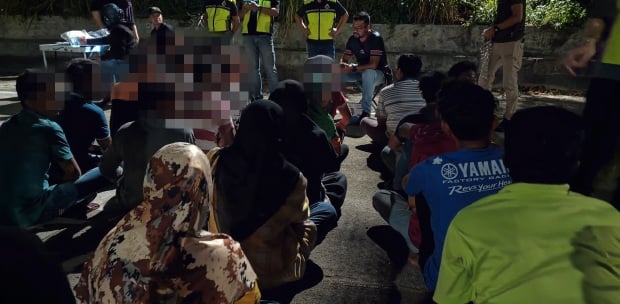IN 1978, it was the Hoa people of Vietnam, fleeing economic hardship imposed by the new communist government of Vietnam. Then between 1990 and 2005, it was the people of Aceh who fled to Malaysia in search of a better life. Now, it is the turn of the Rohingyas.
These past few weeks, international attention has been fixed on what CNN describes as a “human ping-pong” game played between Malaysia, Thailand and Indonesia, with the Rohingyas as the ball. Media reports describe the helplessness of the situation, rights activists speak of the inhumane way the refugees are turned away. In such a situation, it is always easy to allow emotions to get the best of you. Whatever else the Rohingyas may be, they are, above all, human beings.
No one would wish this situation on another person, much less a whole community of people. But in this emotion-charged situation, there has to be a separation between humanitarian concerns and the national interest, no matter how difficult this may be.
Members of the Rohingya community arriving in droves through the Andaman Sea and the Straits of Malacca can be classified as either “stateless” or “refugees”. They are stateless because they are not officially the nationals of any country. They are refugees because the United Nations has identified them as persecuted persons.
Unfortunately for them, they have chosen to flee to the three countries that are not parties to the 1951 UN Convention relating to the Status of Refugees. In fact, of the 10 Asean member states, only the Philippines and Cambodia are party to the Convention and, therefore, obliged under international law to provide for them.
This argument that countries that are not party to the Convention have no obligations does not hold water. In fact, any state can sign and ratify any convention they wish at the drop of a hat, if they choose. That eight of the 10 Asean member states have chosen not be bound by the Convention says something else, and hints at more than the lack of political will. It means that these states believe that it is not in the interest of their country, and by extension, their citizens, to be so bound.
This does not make these countries cold-hearted.
Consider this: for countries that are not parties to this particular UN Convention, the three countries (Thailand, Malaysia and Indonesia) have allowed a UNHCR office on their territory to deal with refugees. In 2013, the UNHCR office in Malaysia reported the highest number of new asylum claims in the world, with 53,600 claims. Turkey with 44,830 claims, Kenya (19,200 claims) and Egypt (10,800 claims) were second, third and fourth respectively, but all three of these countries are state parties while Malaysia is not. In fifth place globally, is Indonesia with 8,300 new asylum claims — also not a state party.
The UNHCR office is mandated to seek a durable solution to the refugees’ problem, either by returning them to their homeland, settling them in the country of asylum, or resettling them in a third country. To all intents and purposes, most of these persons of concern want to settle in the country where they are seeking asylum, or be resettled in another economically-vibrant country.
The easiest solution would be to allow the UNHCR office to document the Rohingyas as refugees, and then resettle them elsewhere if these three countries are not willing to take them in. But if the UNHCR offices in Jakarta and Bangkok are anything like Kuala Lumpur’s, they would already be bursting at the seams with applications.
In February this year, the UNHCR in Kuala Lumpur released their latest figures — “152,570 refugees and asylum-seekers registered with the UNHCR in Malaysia”, an increase of 50 per cent from a mere four years ago. “Registered” means that the people are in Malaysia under UNHCR protection instead of being resettled. And the reason why the numbers keep increasing is because resettlement to a third country is not as easy as it sounds.
First of all, a country has to be found that is willing to take in the “registered refugees”. There are currently only 27 “resettlement states” in the world; these are countries that have an established resettlement programme — the provision of housing, financial assistance, medical care, education and a public engagement programme to ensure that the refugees are accepted by the community.
Even with these resettlement states, there are certain established criteria that must be fulfilled on the part of the refugee. State practice is never as easy as Hollywood makes it out to be — you cannot turn up on a country’s doorstep and then “claim asylum”.
The United States, for example, which has a robust refugee acceptance process, still requires the refugee to apply before arrival into the country. Once certain criteria are met, an interview would then be held either by the embassy, or the UNHCR office.
Even when thousands of people fled to the United States following World War I, they were duly processed at Ellis Island before a determination was made if they could be allowed to enter. Questions were asked, and they had to show that they could support themselves, or at least have enough money for a new beginning. If they were ailing, or had health problems, they would be turned away.
Establishing a criteria for acceptance is, therefore, nothing new. The criteria that is often bandied about in terms of successful resettlement to a third country, is “employability skills”. It makes sense that no country would want to voluntarily accept non-citizens who will be a perpetual drain on their resources.
For those countries that are temporarily housing the refugees, such as Thailand, Malaysia and Indonesia, there is no quick and easy solution to this heart-wrenching problem.
Once the asylum seekers are at the border of a country, the principle of non-refoulement under customary international law would apply. The asylum seeker then cannot be repatriated unless there are reasonable grounds to show that the asylum seeker is a danger to the security of the country. Already, there are arguments as to when the principle applies — when they first come into contact with the government authorities (even at sea) or when they enter the country.
A long-term solution to provide safe haven to the Rohingyas might be to establish a sponsorship system. The refugee may stay if he or she is sponsored by a citizen, which means that the citizen would be responsible for the housing, medical care, education and livelihood of the refugee. Enforcement would need to be strict, along the lines of accepted norms of decency and within the bounds of the law, so that trafficking and slavery will not manifest itself. Other criteria can be developed as is fitting.
There would still be forms to fill and documents provided, but at least it would mean that those adrift in turbulent seas would stand at least a fighting chance, and the humanitarians among us will be able to step up and make a difference. Asia is not well-off enough to have welfare states, and the state is only obliged to ensure the opportunity of a good life among its citizens. We need to separate our individual humanity from the governance of the country — if our heart bleeds, then it is up to us as individuals to do something, not the state.
The writer is a Malaysian diplomat who has served in the UN (New York) and is currently pursuing her PhD at the University of Sheffield





